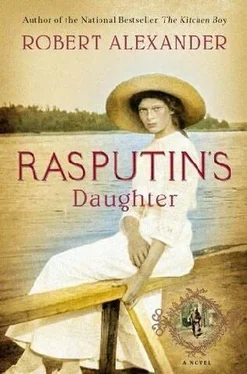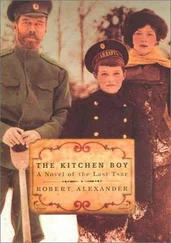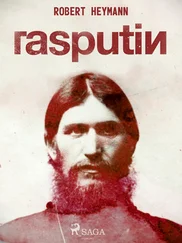“Let them scream! I saw all this in the night like a vision! Mama, you must tell Papa. I beg you, you must tell him! You must write to him at once of this.”
“Yes, of course. I see your point quite clearly,” said Aleksandra Fyodorovna, nodding pensively as she gently twiddled with her long necklace of large pearls.
“Three days-no other trains except those carrying flour, butter, and sugar,” my father repeated. “Otherwise there will be great unhappiness. And into this unhappiness will rush a flood of problems. It’s quite necessary!”
“Yes, essential.” The Empress nodded. “I will tell my husband, and he will make it so. It is his will, and he is master.”
Papa puffed out his lower lip and bobbed his head in agreement and approval.
Vyrubova spoke up. “Now, what of the new minister? The position of Minister of Internal Affairs is quite-”
“I know, I know!” Papa rubbed his hands together. “Now…well, the Old Chap came to see me, this Boris Stürmer, but I had an interesting vision of this other fellow, Protopopov!”
“Really?” said the Tsaritsa in amazement.
“Yes, a vision from on high!”
Precisely at four, right on cue, the doors opened and the Empress and her small cabinet of advisers ceased conversation. As we watched, a bevy of liveried footmen with snow-white garters swept in and spread a tablecloth over two small tables, then set out glasses in silver holders and plates of hot bread and English biscuits. Had the Tsar not been at the front, where he had taken personal command of the troops, he would certainly have joined us.
“We shall continue these discussions later,” commanded the Empress, rising from her chair. “First let us refresh ourselves.”
Aleksandra Fyodorovna paid Papa and me a great honor by pouring our tea with her own hand. Accepting my glass, I carefully eyed the bread and biscuits.
With a wry smile, the Empress said warmly, “I’m sure, my child, you’ve been to many more interesting teas than this one. Others, I know, serve different cakes and sweetmeats, but, alas, I am unable to change the menu here at the Palace. All runs on tradition and is the same since our great Catherine.”
But it was an interesting tea. Amazingly so, I thought, as I carefully took a biscuit and found my seat. Just imagine, my father giving so much help and advice, so many of his visions, to Empress Aleksandra Fyodorovna, who would pass it all on to the Tsar. Just imagine Papa emerging from the depths of Siberia and coming to the aid of the Motherland. Incredible, I thought, beaming with pride at my father, as he slurped his tea and munched on a biscuit and the crumbs flew.
So what was I now to do with those memories of my father the hero? Burn them, stomp them, rip them to shreds?
Tormented by confusion, I fled the closet and ran to my room, where I leaped into bed and fell into a black hole. When my sister wanted to know what on earth was wrong, I shouted at her to get out, and then my tears came so quickly, so heavily, that by the time I finally stopped crying my eyes were practically swollen shut. I just lay there, hidden and huddled under the down comforter, my arms and hands clasped around my knees. But I could find no comfort, no matter how hard I hugged myself. I simply cried and cried.
Many in the highest society, including the Tsar and Tsaritsa themselves, clung to the myth of the Russian peasant, believing that only in the huts of the poorest of the poor lived the true spirit of Christ. And yet now I knew what even the Tsar did not, that in my peasant father there dwelled both the spirit of Christ and also, at the very least, the spirit of a fool-not a holy fool but a simple one. We should leave the capital. For his own protection, not to mention ours, I should force Papa out of the city. He should abandon any pretense of holiness and simply melt away into Siberia and her endless forests. A life of fasts and visions and ragged clothing-that was what was meant for my father.
My head buried beneath my pillow, my body protected by the billowing feathers of the comforter, I lay curled up for hours, drifting in and out of misery and sleep. Finally, toward six, I heard Dunya beckoning us all to the table, for like all Russian women, she believed in the sanctity of coming together around food. Rising, I made a feeble attempt at brushing my hair and went to the dining room.
Dunya and Varya had obviously been busy. Our brass samovar, polished until it glowed like gold and boiling with water, sat by the window, and our heavy oak dinner table, the kind so popular among the city bourgeoisie, was covered with plates of cold zakuski: pickles, sour cream, salted herring garnished with onions, grated carrots mixed with mayonnaise and garlic, salted tomatoes, pickled mushrooms, smoked fish, stuffed eggs, and Papa’s favorite appetizer, jellied fish heads. Tonight, it was obvious we would feast not on fancy city things but real food.
“Girls, please take your places while I fetch your father,” Dunya said.
As she scurried off, the two of us stood behind our chairs, and my sister looked up at me, asking softly, “Are you all right, Maria? Why were you so upset?”
“Nothing,” I mumbled.
I stared at Varya, who was so proud of studying at middle school here in the capital that even now she wore the black-and-white frock of the gymnasia. She had my father’s blunt chin, his dark hair, his large full lips, and short black bangs, which she kept flipping back. She worshiped Papa, and to her, it wasn’t unusual at all that our humble father should be telephoned once or twice a day by the Empress herself, let alone summoned at any hour to the palace.
“What happened this afternoon?” she asked, not particularly concerned as she scooped up some carrot salad with her finger. “I heard a woman screaming.”
I shrugged. “You know how people are always after Papa for things.”
For the first time ever I was dreading a family meal. What was I going to say to my father? How would I even be able to look at him? But when he came in a few moments later it was not with his booming voice and quick step. Rather it was with a shuffle, for he was walking only with the aid of Dunya, who held him by the left arm.
“Papa, what’s the matter?” gasped Varya, rushing to his side.
He looked awful, as if he’d just aged twenty years, and for a brief moment I felt a pang of worry. His hair fell every which way like a field of wheat after a summer storm, his face was pallid, and his eyes were red. He was dressed terribly too, wearing a dirty pair of baggy pants and an unbelted tunic of coarse cotton.
“I had another dream…another vision…”
“Please, Father Grigori,” coaxed Dunya. “Just tea and a little food. Then you’ll feel better, I promise.”
They led Papa along, Dunya on one side and Varya on the other. Back home there was a bent old man who lived in a falling-down hut, and we taunted him mercilessly, calling him a starii xhren-an old piece of horseradish. Right here and now, that was my father. Had he fallen into a pool of remorse? Had he begged God’s forgiveness for the way he’d treated that woman? I could only hope so.
I stood motionless behind my chair as Dunya poured some tea concentrate from the small pot atop the shiny samovar, to which she added hot water from the spigot. As if it were nothing but cool water from a stream back home, he downed the glass in one gulp. Dunya then poured him another, which he likewise drank to the bottom. And another. Papa sometimes drank as many as fifty glasses of tea in a day, but never like this, as eagerly as a sunburned man just in from the desert. Finally, with his fourth glass in hand, he sat down. Only then did the three of us take our seats.
Читать дальше












